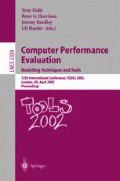Abstract
In this paper we describe a formalism which uses the stochastic process algebra PEPA as the inscription language for labelled stochastic Petri nets. Viewed in another way, the net is used to provide a structure for combining related PEPA systems. The combined modelling language naturally represents such applications as mobile code systems where the PEPA terms are used to model the program code which moves between network hosts (the places in the net). We describe the implementation of a tool to support this modelling formalism and apply this to model a peer-to-peer filestore.
Access this chapter
Tax calculation will be finalised at checkout
Purchases are for personal use only
Preview
Unable to display preview. Download preview PDF.
References
M. Ajmone Marsan, A. Bobbio, and S. Donatelli. Petri nets in performance analysis: An introduction. In Reisig, W. and Rozenberg, G., editors, Lectures on Petri Nets I: Basic Models, volume 1491 of LNCS, pages 211–256. Springer-Verlag, 1998.
J. Hillston. A Compositional Approach to Performance Modelling. Cambridge University Press, 1996.
M. Bernardo and R. Gorrieri. A tutorial on EMPA: a theory of concurrent processes with nondeterminism, priorities, probabilities and time. Theoretical Computer Science, 202: 1–54, 1998.
H. Hermanns. Interactive Markov Chains. PhD thesis, Universität Erlangen-Nürnberg, 1999.
S. Donatelli, J. Hillston, and M. Ribaudo. A comparison of Performance Evaluation Process Algebra and Generalized Stochastic Petri Nets. In Proc. 6th International Workshop on Petri Nets and Performance Models, Durham, North Carolina, 1995.
S. Gilmore, J. Hillston, and L. Recalde. Elementary structural analysis for PEPA. Technical Report ECS-LFCS-97-377, Laboratory for Foundations of Computer Science, Department of Computer Science, The University of Edinburgh, 1997.
I. C. Rojas M. Compositional construction and analysis of Petri net systems. PhD thesis, The University of Edinburgh, 1997.
J. Hillston, L. Recalde, M. Ribaudo, and M. Silva. A comparison of the expressiveness of SPA and bounded SPN models. In B. Haverkort and R. German, editors, Proceedings of the 9th International Workshop on Petri Nets and Performance Models, Aachen, Germany, September 2001. IEEE Computer Science Press.
C. Reinke. Haskell-Coloured Petri Nets. In Implementation of Functional Languages, 11th International Workshop, volume 1868 of LNCS, pages 165–180, Lochem, The Netherlands, September 1999. Springer-Verlag.
M. Becker and H. Szczerbicka. PNiQ: Integration of queuing networks in generalized stochastic petri nets. IEE Proceedings—Software, 146(1):27–33, February 1999. Special issue of the proceedings of the Fourteenth UK Performance Engineering Workshop.
F. Bause. Queueing Petri nets—a formalism for the combined qualitative and quantitative analysis of systems. In 5th International Workshop on Petri Nets and Performance Models, pages 14–23, Toulouse, France, October 1993.
B.R. Haverkort, I.G. Niemegeers, and P Veldhuyzen van Zanten. DyQNtool—a performability modelling tool based on the dynamic queueing network concept. In G. Balbo and G. Serazzi, editors, Modelling Techniques and Tools for Computer Performance Evaluation, pages 181–195. North-Holland, 1992.
R. Valk. Petri nets as token objects—an introduction to Elementary Object Nets. In J. Desel and M. Silva, editors, Proceedings of the 19th International Conference on Application and Theory of Petri Nets, volume 1420 of Lecture Notes in Computer Science, pages 1–25, Lisbon, Portugal, 1998. Springer-Verlag.
C. Priami. Stochastic π-calculus. In S. Gilmore and J. Hillston, editors, Proceedings of the Third International Workshop on Process Algebras and Performance Modelling, pages 578–589. Special Issue of The Computer Journal, 38(7), December 1995.
K.G. Larsen. Compositional theories based on an operational semantics of contexts. In REX Workshop on Stepwise Refinement of Parallel Systems, volume 430 of LNCS, pages 487–518. Springer-Verlag, May 1989.
G. Clark. Techniques for the Construction and Analysis of Algebraic Performance Models. PhD thesis, The University of Edinburgh, 2000.
J.F. Groote. Transition system specifications with negative premises. Theoretical Computer Science, 118(2):263–299, 1993.
S. Gilmore and J. Hillston. The PEPA Workbench: A Tool to Support a Process Algebra-based Approach to Performance Modelling. In Proceedings of the Seventh International Conference on Modelling Techniques and Tools for Computer Performance Evaluation, number 794 in Lecture Notes in Computer Science, pages 353–368, Vienna, May 1994. Springer-Verlag.
G. Clark, T. Courtney, D. Daly, D. Deavours, S. Derisavi, J. M. Doyle, W. H. Sanders, and P. Webster. The Möbius modeling tool. In Proceedings of the 9th International Workshop on Petri Nets and Performance Models, pages 241–250, Aachen, Germany, September 2001.
R. Milner, M. Tofte, R. Harper, and D. MacQueen. The Definition of Standard ML: Revised 1996. The MIT Press, 1996.
G. Clark and W.H. Sanders. Implementing a stochastic process algebra within the Möbius modeling framework. In L. de Alfaro and S. Gilmore, editors, Proceedings of the first joint PAPM-PROBMIV Workshop, volume 2165 of Lecture Notes in Computer Science, pages 200–215, Aachen, Germany, September 2001. Springer-Verlag.
I. Clarke, O. Sandberg, B. Wiley, and T.W. Hong. Freenet: A distributed anonymous information storage and retrieval system. In H. Federrath, editor, Designing Privacy Enhancing Technologies: International Workshop on Design Issues in Anonymity and Unobservability, volume 2009 of Lecture Notes in Computer Science, pages 46–66, Berkeley, California, 2001. Springer-Verlag.
M. Kwiatkowska, G. Norman, and D. Parker. PRISM: Probabilistic symbolic model checker. This volume, 2002.
S. Gilmore, J. Hillston, and M. Ribaudo. PEPA-coloured stochastic Petri nets. In K. Djemame and M. Kara, editors, Proceedings of the Seventeenth UK Performance Engineering Workshop, pages 155–166, University of Leeds, July 2001.
Author information
Authors and Affiliations
Editor information
Editors and Affiliations
Rights and permissions
Copyright information
© 2002 Springer-Verlag Berlin Heidelberg
About this paper
Cite this paper
Gilmore, S., Hillston, J., Ribaudo, M. (2002). PEPA Nets: A Structured Performance Modelling Formalism. In: Field, T., Harrison, P.G., Bradley, J., Harder, U. (eds) Computer Performance Evaluation: Modelling Techniques and Tools. TOOLS 2002. Lecture Notes in Computer Science, vol 2324. Springer, Berlin, Heidelberg. https://doi.org/10.1007/3-540-46029-2_7
Download citation
DOI: https://doi.org/10.1007/3-540-46029-2_7
Published:
Publisher Name: Springer, Berlin, Heidelberg
Print ISBN: 978-3-540-43539-6
Online ISBN: 978-3-540-46029-9
eBook Packages: Springer Book Archive

